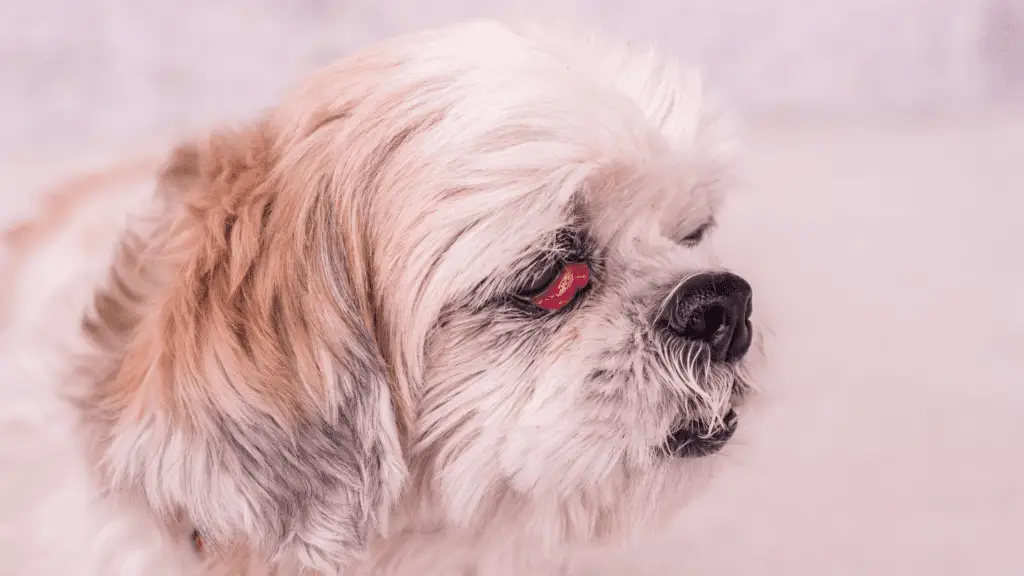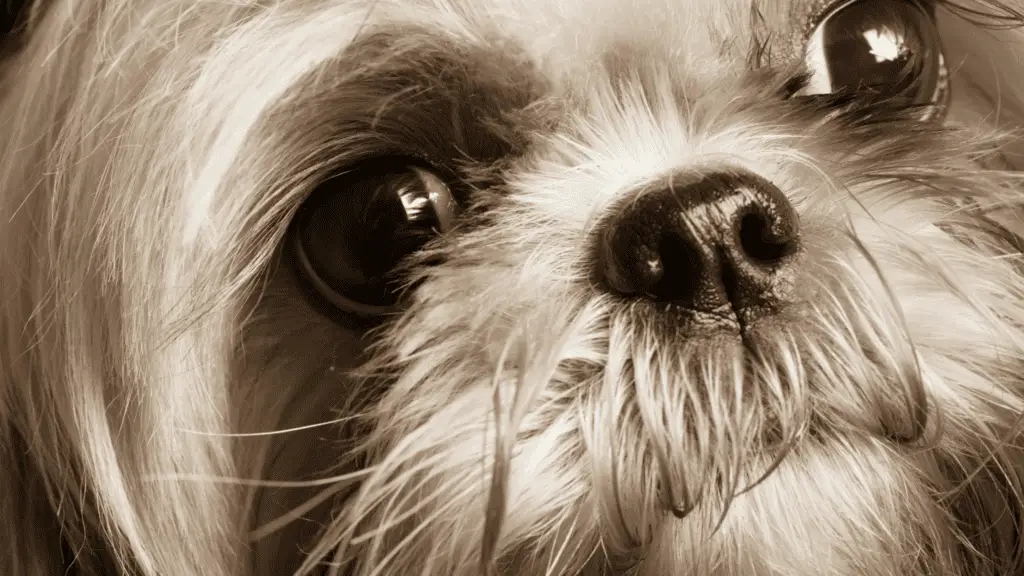
Having a Shih Tzu as a family pet can be high maintenance, especially with its eye care.
Due to the breed’s susceptibility to cataracts, eye infections, and ulcers, keeping their eyes clean and clipping the fur around them is essential to prevent irritation.
Due to Shih Tzu’s size and sensitivity, they have several specific eye disorders, including edema, redness, excessive blinking, and runny or thick discharge.
Any of these symptoms could be indicative of the subsequent issues.
The most common Shih Tzu eye problems
Below are some prevalent eye conditions that may affect the Shih Tzu.
Early detection is essential if you want your dog to recover as soon as possible.
Shih Tzu Cataracts
Typically, this is a genetic health condition in dogs.
If genetic, this is more prevalent in Shih Tzu after eight years.
Nevertheless, a dog may develop a cataract due to an eye injury.
When this condition develops, the lens of the dog’s eye becomes “cloudy.” Without treatment, a dog with this condition can become blind.
Typically, surgery removes a dog’s cataract with excellent results.
The operation removes the danger of the dog going blind; nevertheless, some scarring may form and lead to a slight decline in clear eyesight.
Corneal Ulcerations
This is an eye ailment in which the cornea of the dog’s eye develops an ulcer, as the name suggests.
Injuries to the Shih Tzu’s eye are typically the cause.
This can occur if a foreign object scratches the Tzu’s eye.
Frequently, the tear that happens is not noticeable.
You will suspect that your Shih Tzu has this condition if they frequently close their eyes, leave one eye partially open, or have excessive tear production.
Once diagnosed by a veterinarian, treatment often consists of daily eye drops to lubricate the eye, reduce inflammation and alleviate pain until the dog’s body naturally mends the tear.
Shih Tzu Eye Infection
Due to the numerous environmental factors and bacteria that touch the slightly protruding eyes throughout the day, any Shih Tzu is susceptible to developing an eye infection.
In the absence of treatment, an infection is likely to persist and eventually impair vision.
Common signs include redness or swelling around the eye or eyes of the Shih Tzu dog, excess discharge, and aversion to bright lights.
Only an experienced veterinarian can determine whether the symptoms indicate allergies, bacterial illnesses, or viral infections.
If your dog’s eye(s) are infected, antibiotic eye drops are typically the best treatment option.
Shih Tzu Eyelash Problems
A Distichia is an eyelash that arises from an irregular area on a dog’s eyelid, while Trichiasis is the medical term for an ingrown eyelash on a dog.
Both might cause a dog significant suffering until therapy is administered.
How will you determine whether your Shih Tzu has this eye condition?
In numerous instances, the offending lash will be visible.
In the absence of treatment, you will observe your dog attempting to “scratch” their eye or rubbing his face against pillows, etc., to alleviate the discomfort. Since eyelashes can return, electrolysis is the most popular and effective method for removing them permanently.
Pink eye in Shih Tzu dogs or Shih Tzu dog conjunctivitis
Typically, the signs of this condition are straightforward to recognize.
Shih Tzu’s eye will turn red or pink.
Typically, discharge, edema, and indications of general discomfort are evident.
Several reasons can cause pink eye in Shih Tzus, including:
• The bacterial form is transmitted through touch. This can occur between humans and dogs, between dogs, etc.
• The virus is airborne and arises more frequently during cold months with little humidity.
• Allergies
• Foreign bodies in the eye of the dog
Because these symptoms may also indicate other vision problems in the Shih Tzu, it is crucial to have a veterinarian make the definitive diagnosis.
The treatment will vary but will typically consist of medication to minimize swelling and combat bacterial infection.
Glaucoma in Shih Tzus?
Glaucoma is a condition that occurs when the eye’s fluids are unable to drain correctly.
It increases intraocular pressure, which is quite unpleasant for your dog.
If left untreated, it will induce eye swelling and potentially alter the eyeball shape.
Glaucoma is frequently a condition in and of itself in dogs, but it can also result from an eye infection or disease.
Glaucoma is characterized by dilated pupils, protruding eyes, and vision loss.
The treatment for glaucoma varies on the etiology and severity of the disease.
Medication may assist, but if eyesight has already been lost, it is usually advisable to remove the damaged eye to alleviate the pain or swelling.
Many of these eye conditions cannot be prevented, but they can be prevented from becoming serious health problems.
Maintain a close watch on your Shih Tzu’s eyes, clean them frequently, and schedule an appointment with your veterinarian as soon as you notice any infection or irritation so that it may be treated promptly and does not cause permanent harm to your Shih Tzu’s eye or vision.
What are the indications that your Shih Tzu has vision issues?
Indications of Shih Tzu eye disorders are comparable to those of other breeds.
Possible symptoms include redness, inflammation, severe tearing and discharge from the eyes, squinting in direct sunlight (photosensitivity), and impaired or absent vision.
Certain diseases afflict Shih Tzus more commonly than others, such as progressive retinal atrophy, which typically causes blindness in middle-aged Shih Tzus.
What to do if Shih Tzu’s Eyes get Injured?

Whether your Shih Tzu is wounded during play or accidentally bumps into something in their environment, like furniture or walls, it can be easy to see injuries on other areas of their body, but it can be challenging to identify if a Shih Tzu has an eye injury.
The most prevalent injuries in this region are scratches from branches or thorns when they walk outside, being struck by anything, or accidentally getting too close to their eyes while eating.
If your dog’s eyes are hurt, you should take the first step to prevent an infection.
Wash it gently with warm water, but do not rub it, as this might cause additional tears!
It is also crucial that you take them to a veterinarian as soon as possible so they may be evaluated correctly.
If the region seems red or inflamed, your Shih Tzu is likely experiencing pain, resulting in abnormal behavior such as licking the eye or refusing to eat.
If this occurs, see your veterinarian about administering a pain reliever and using an antibacterial eyedrop to prevent infections.
As a result of their proximity to us, Shih Tzus frequently sustained injuries to the area around their eyes while being petted or fed.
Nevertheless, it should be simple to prevent your dog from becoming wounded if you take precautions!
How to clean and care for the eyes of your Shih Tzu?

Wipe the face with the warm washcloth, paying attention to any tear residue accumulated around the eye corners. Do so carefully.
You may now use tearless dog shampoo to remove any tear residue from the fur surrounding the dog’s eyes.
The shampoo will aid in removing the residue, and since it is tearless, the dog will not experience any discomfort.
Finally, you can comb out the dog’s hair so that it does not cover its eyes. This will also reduce the accumulation of residue.
You can perform a quick cleaning every few days.
After consistent application, the accumulation around the dog’s eyes will become less constant.
The dog will appreciate this affectionate time, and you will have a well-groomed and healthy Shih Tzu.
Shih Tzu Eye Care Safety Measures
According to some beliefs, adding leafy green vegetables, parsley, and carrots to a dog’s diet will help maintain its eyes healthy.
According to several studies, adding Vitamin A, C, and D supplements to a dog’s food has yielded positive benefits.
At-home care is the most effective method for preventing Shih Tzu eye disorders.
First, ensure that their nails are regularly trimmed, as long nails might scrape the surface of their eyes.
You should also constantly clean the surrounding area behind their eyes since any dirt that enters it could cause abrasions or an infection.
You should also ensure that you visit your veterinarian regularly for checkups so that they may have Shih Tzu eye care examinations and any issues can be detected early.
This yields the best outcomes for treating and curing your dog’s ailment.
If you notice anything unusual about your dog’s eyes, you should take them to the vet so that they may correctly diagnose your pet; this is proper Shih Tzu eye care!
Conclusion
Shih Tzu eye care is a significant aspect of owning a Shih Tzu as a pet because your dog’s eyes are essential to their health.
If your pet exhibits these symptoms, you should call a veterinarian immediately for treatment.
You should also be aware of preventing eye problems in your dog by paying attention to their diet and their everyday environment.
Regular trips to the veterinarian may seem excessive, but they can help keep your pet healthy and happy!
Guest Post by Doctor Usman (Doctor of Veterinary Medicine)
Read more Shih Tzu advice articles below:
- Shih Tzu Personality Traits: What Makes Them So Special?
- How to Create the Perfect Routine for Your Shih Tzu
- Understanding Shih Tzu Behavior: What’s Normal and What’s Not
- The Ultimate Shih Tzu Puppy Checklist: What You’ll Need
- How to Choose the Right Vet for Your Shih Tzu


